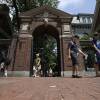One grew up in a refugee camp, the other homeless in Newburyport. Together they’re changing the lives of a generation of kids born in the wake of genocide. And their main tool is something many people would be delighted to donate.
Inside Hopkinton’s century-old public library, you’ll find a polished wooden staircase which leads to the children’s room.
There’s an arched ceiling, windowed alcove, and more books than space.
Books no longer needed are carefully packed away in cardboard boxes: Parfait Gasana is here to give them new life.
The hundreds of books he’s collecting here in his hometown of Hopkinton will be added to the thousands headed for his home country, Rwanda.
Rwandan children typically don’t start school until they’re seven -- and even then -- rarely touch a book.
“At times we had a class with probably 100 kids in it probably one book that the professor - teacher - himself would have and that was the only book that was in the class,” says Parfait.
Parfait was born in a refugee camp; his parents fled the 1994 Rwandan genocide that left eight-hundred- thousand people dead. Today English is an official language and Parfait believes teaching kids to read will help create a more tolerant, peaceful country. He picks up a colorful paperback called “The Crocodile and the Dentist”.
“These are pretty easy for kids to learn from,” he says.
He knows from experience. When he arrived in the U.S. a decade ago at age twenty-three, he learned English from picture books.
“I read Curious George. I’m going to be honest here,“ Parfait says, "I didn’t know English… [but] you could see signs, you could see what he was doing.”
It was the beginning of an academic career that led him to UMass Boston where he earned a Masters Degree … and - along with classmate Wade Cedars - launched a plan to get books to children in Rwanda.
“I see myself in these children,” Wade says.
Wade grew up a world away from Rwanda in the north shore town of Newburyport. But like Parfait, had no permanent home, at one point he lived in the family minivan.
“I found education to be my outlet as well,” Wade says. “So when he said he wanted to do something to give these children an opportunity - I couldn’t turn it down.”
Last summer, Wade and Parfait arrived in Rwanda’s capital city of Kigali their bags stuffed with books.
Wade says, “We had droves of children running down the street barefoot because we were handing out books out of a backpack. And endless, endless children calling out to more friends. They just kept coming.”
They set up the Kigali Reading Center. Kids gather for stories and songs. And they borrow books to take home.
Parfait says, “We started with 8 kids when we launched and today we’re serving over a 100 kids…”
“100 children a week” Wade interjects.
”…And over 30 volunteers” Parfait finishes.
Among their early success stories was a boy named “Levi”.
According to Parfait, “He came every single day to the center and when we first launched the program he could not read alphabets and today he stands in front of the entire group and reads to other kids and I think that is transformational.”
Cedar adds “It is transformational, a perpetual cycle of giving from education.”
Books changed their own lives — and Parfait and Wade believe they can do the same for Rwanda.
Meanwhile, in the parking lot at UMass Boston, they are transferring another load of donated books to the trunk of Parfait’s car when Wade pulls a bright yellow paperback from the top of a box.
“Oh you’re never going to believe this,” says Parfait.
“What is it?,” asks Cedar.
“Curious George!”, says Parfait… and the men erupt in laughter.
A book that started a whole new story.




